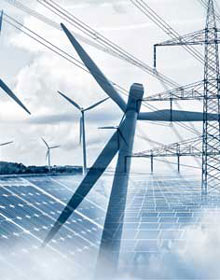
In a bold move towards sustainable energy, South Africa is urging its residents to invest in solar power as a way to integrate more renewable energy into the national grid. Electricity Minister Kgosientsho Ramokgopa expressed optimism that this transition will not only bolster the country's energy capacity but also eventually lead to reduced electricity costs for consumers. His comments came during a recent energy update where he outlined the government's strategic plans to enhance renewable energy infrastructure.
Minister Ramokgopa pointed to the declining costs of solar and wind energy as a key motivator for encouraging investment in these technologies. Over the course of six bid windows, the prices for these renewable energy sources have seen a consistent downward trend. This reduction in cost makes them increasingly attractive options for both individual consumers and the national grid.
"The cost of solar and wind energy has dropped significantly, making them viable alternatives to traditional energy sources," Ramokgopa stated. "We are urging residents to take advantage of these affordable options."
The South African government is intensifying its efforts to grow the country's renewable energy capacity. One of the ideas being explored is the establishment of large-scale solar and wind parks. These parks are envisioned as centralized hubs where renewable energy can be generated efficiently and economically.
However, the immediate focus is on expanding battery storage capacity to support the integration of renewable energy sources into the grid. "We expect this bid window to generate about 1,744 megawatts," Ramokgopa announced, highlighting the incremental approach the government plans to take in scaling up renewable energy capacity.

Beyond the environmental benefits, Ramokgopa emphasized the potential of renewable energy to lessen South Africa's reliance on Eskom, the country's primary electricity supplier. By diversifying the energy sources, South Africa can offer more reliable power supply and long-term relief for consumers who have been affected by frequent power cuts and rising electricity costs.
"This initiative is not just about going green; it's about energy security and affordability for all South Africans," Ramokgopa explained. "Renewable energy provides new power sources that can alleviate the pressure on Eskom and ensure a steadier supply of electricity."
In a bid to create equitable growth, the government plans to focus on underdeveloped regions like the North West and Free State for future renewable energy projects. These areas have significant potential for solar and wind energy generation, and investing in such projects could spur local economic development.
"By targeting these regions, we are not only expanding our energy capacity but also creating job opportunities and stimulating local economies," Ramokgopa noted. "It's a win-win situation for everyone involved."
As South Africa embarks on this journey towards a renewable energy future, the call for residents to invest in solar power is both a practical and visionary step. The government's commitment to reducing costs, expanding capacity, and ensuring equitable access to energy resources highlights a comprehensive approach to tackling the country's energy challenges. By embracing solar power, South Africans can contribute to a more sustainable and economically viable energy landscape.


8 Comment(s)
FB88 là một nền tảng rất uy tín và đáng tin cậy.
Các cược thể thao trên FB88 rất đa dạng, tôi có thể chọn cược từ nhiều môn thể thao khác nhau.
Các trò chơi game bài trên FB88 rất thú vị, tôi có thể chơi nhiều giờ mà không thấy chán.
LG VINA COSMETICS CO., LTD., established in 1997, takes pride in bringing renowned cosmetic brands and premium home and personal care brands to Vietnamese customers. We currently operate in two main categories: Beauty and HDB (Home Care and Daily Beauty). The Beauty category includes products from skincare, cosmetics, and functional food groups, while the HDB category covers products in home care and daily personal care groups. With a vision to become a leading company in the beauty and health industry, we are meticulous at every stage of management to ensure that our products are of the highest quality and meet customer needs.
LiveBet là một nền tảng giải trí trực tuyến sáng tạo, cung cấp cược thể thao trực tiếp và nhiều tính năng tương tác. Dù bạn là fan của bóng đá, bóng rổ hay các giải đấu eSports, LiveBet đều mang đến cho bạn trải nghiệm cược hấp dẫn. Với hệ thống cập nhật tỷ lệ cược nhanh chóng, bạn có thể cược trong suốt trận đấu và tận dụng mọi cơ hội chiến thắng. Các phương thức thanh toán an toàn và dịch vụ khách hàng 24/7 đảm bảo bạn chơi mà không lo lắng. Tham gia LiveBet ngay hôm nay để trải nghiệm cược trực tuyến tiên tiến nhất!
FB88 có một hệ thống thanh toán rất nhanh chóng và an toàn.
Trò chơi trên FB88 rất dễ chơi, quy tắc rõ ràng và dễ hiểu.
Tôi cảm thấy rất thoải mái khi chơi tại FB88, họ luôn đem lại một trải nghiệm tuyệt vời.
LiveBet là một nền tảng giải trí trực tuyến sáng tạo, cung cấp cược thể thao trực tiếp và nhiều tính năng tương tác. Dù bạn là fan của bóng đá, bóng rổ hay các giải đấu eSports, LiveBet đều mang đến cho bạn trải nghiệm cược hấp dẫn. Với hệ thống cập nhật tỷ lệ cược nhanh chóng, bạn có thể cược trong suốt trận đấu và tận dụng mọi cơ hội chiến thắng. Các phương thức thanh toán an toàn và dịch vụ khách hàng 24/7 đảm bảo bạn chơi mà không lo lắng. Tham gia LiveBet ngay hôm nay để trải nghiệm cược trực tuyến tiên tiến nhất!
Trường Tiểu học Nguyễn Trung Trực được thành lập năm 1985 có địa chỉ tại 9A Phạm Hồng Thái, phường Nguyễn Trung Trực, quận Ba Đình, Hà Nội (Nay thành phường Trúc Bạch). Trường hoạt động dưới sự quản lý của UBND quận Ba Đình và Phòng Giáo dục và Đào tạo Ba Đình. Trường được xây dựng khang trang trên diện tích hơn 3000 m2 với đủ các phòng học và phòng chức năng cho các hoạt động học tập, vui chơi, giải trí của học sinh.
Địa chỉ: Số 9A Phạm Hồng Thái - Ba Đình - Hà Nội
Email: s666@s666s666s.com
website: Https://s666s666s.com/
Điện thoại: 438261441
Trường Tiểu học Nguyễn Trung Trực được thành lập năm 1985 có địa chỉ tại 9A Phạm Hồng Thái, phường Nguyễn Trung Trực, quận Ba Đình, Hà Nội (Nay thành phường Trúc Bạch). Trường hoạt động dưới sự quản lý của UBND quận Ba Đình và Phòng Giáo dục và Đào tạo Ba Đình. Trường được xây dựng khang trang trên diện tích hơn 3000 m2 với đủ các phòng học và phòng chức năng cho các hoạt động học tập, vui chơi, giải trí của học sinh.
Địa chỉ: Số 9A Phạm Hồng Thái - Ba Đình - Hà Nội
Email: s666@s666s666s.com
website: Https://s666s666s.com/
Điện thoại: 438261441
This broke it down in the best way. I’ll be applying this right away.
Leave a Comment